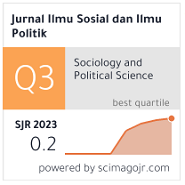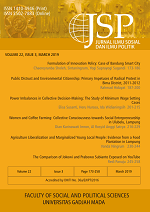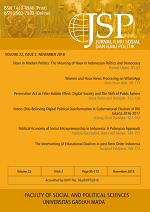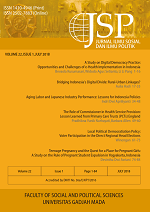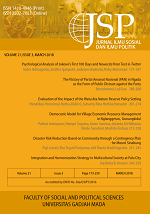Reformasi Konstitusi Dalam Transisi Menuju Demokrasi
https://doi.org/10.22146/jsp.11123
Cornelis Lay
(1*) , Amalinda Savirani
(2)
(1) Universitas Gadjah Mada
(2) Universitas Gadjah Mada
(*) Corresponding Author
Abstract
Constitutional reform is one of the most important ways undertaken by some transitional regime to establish a democratic government. This kind of reform has many models. In Spain i t is called reforma pactada-ruptura pactada involving "negotiation" among elite, and a "rupture" from the previous regime whose legacy cannot be maintained any longer. The similar model, with different stressing, also took place in Taiwan. As Indonesia is now facing its critical moment in managing political transition following a thirty-two-year authoritarian regime of New Order, a comparative study is valuable in giving inspiration on what route should be pondered. One important political decision to be taken is to reform the constitution, namely the UUD 45. Since its broad and open-to-interpretation character and its executive-heavy, the constitution is easily manipulated Yet, the constitutional reform idea has been critical as it is suspiced by certain groups with its concern on the total changing of the law, and also because the law has been merely a sacred text which left no chance to be reformed. This article suggests that the constitutional reform is possible, it is even a must, as long it is still in the path of the preambule as other country cases had shown how significant the constitutional reform for the process of democratization.
Keywords
reformasi konstitusi; transisi politik; demokrasi
DOI:
https://doi.org/10.22146/jsp.11123
Article Metrics
Abstract views : 2940
|
views : 3002
Refbacks
There are currently no refbacks.
Copyright (c) 2016 Jurnal Ilmu Sosial dan Ilmu Politik
<div class="statcounter"><a title="Web Analytics" href="http://statcounter.com/" target="_blank"><img class="statcounter" src="//c.statcounter.com/10932543/0/2e122c85/0/" alt="Web Analytics"></a></div> <div class="statcounter"><a title="Web Analytics Made Easy - StatCounter" href="http://statcounter.com/" target="_blank"><img class="statcounter" src="//c.statcounter.com/10932543/0/2e122c85/0/" alt="Web Analytics Made Easy - StatCounter"></a></div> View My Stats







